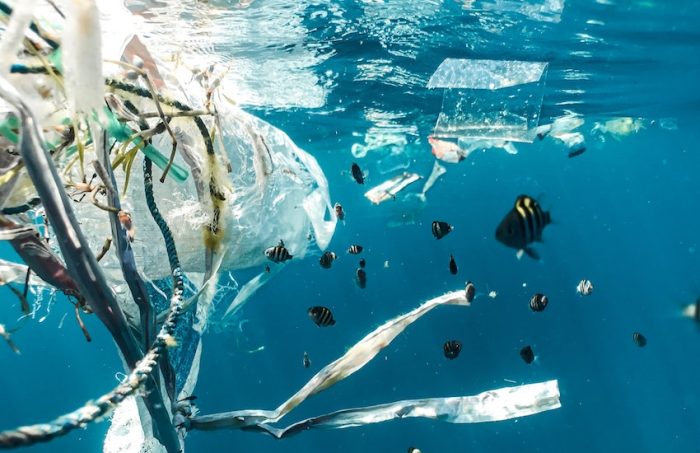

By Hannah Voak
These local green initiatives prove that small actions can make a big difference in tackling plastic pollution.
Plastic pollution is one of the biggest environmental issues we face today. It impacts all corners of the world – contaminating waterways, threatening wildlife, impacting our health and contributing to climate change.
The global plastic crisis is a symptom of our throwaway culture. Many everyday products, such as takeaway coffee cups and food packaging, are used for only a few minutes before being discarded. Yet they can persist in the environment for hundreds of years.
While it’s easy to feel overwhelmed by the scale of our plastic problem, small changes can all add up to make a difference. So grab your reusable water bottle and say ‘see you later’ to single-use bags because here are six sustainable initiatives that are changing the local landscape when it comes to plastic waste.
Water refill stations
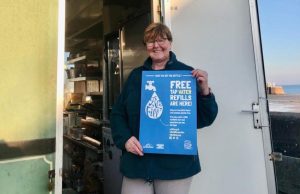
Single-use plastic bottles remain one of the worst offenders of plastic pollution. In Jersey, it’s estimated that we buy 40 million bottles every year, and only 8% of these make it into the recycling stream.
Throughout their lifecycle, plastic bottles have a significant carbon footprint. Greenhouse gases are emitted at every stage, from fossil fuel extraction to plastic production, transportation, and recycling.
We need to tackle our plastic problem at the source. And that’s where ‘Refill’ comes in – a grassroots movement and green initiative making it easier for people to reuse and refill their water bottles for free.
Thanks to the Refill app, users can easily find local refill stations to top up their water bottles or shop with less plastic packaging. There are currently over 40 venues listed in Jersey, including independent cafes, community buildings and the public library.
Participating businesses also display a Refill sticker in their window, alerting passers-by that they can fill up for free. You can also log your refill on the app to track how much plastic you’ve prevented from going to waste.
‘Potty’ plant pot recycling
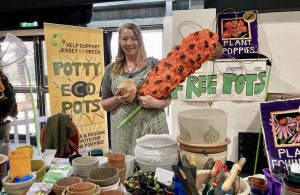
In 2021, environmental campaigner Kalina Le Marquand discovered that hundreds of plastic plant pots were being burned in the Island’s incinerator every week. From then on, she vowed to help clean up Jersey’s plastic waste problem and launched a new garden reuse initiative, Potty Eco Pots.
Most plastic plant pots are made from low-grade mixed plastics, which we can’t recycle in Jersey. To stop them from being thrown away, Kalina encourages people to drop off their unwanted pots and trays at one of many collection points now available across the Island. Others can then pick up the pots to use free of charge.
‘It’s just potty how many pots find their way to the waste stream that can be gifted and reused,’ Kalina says. ‘It’s also helping cut down on imported goods to the Island. If people aren’t buying pots, they won’t be imported.’
Beach toy ‘borrow box’
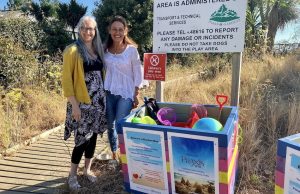
Thousands of beachgoers flock to Jersey’s coastline every year, armed with buckets, spades, and other seaside toys. But have you considered what happens to all these items when the summer season comes to an end?
At best, unwanted beach toys end up gathering dust back home. At worst, they wind up in the ocean and break down into microplastics. But the large majority are destined for the incinerator.
Local environmentalists Louise Carson and Tara Dolan launched a new beach toy borrowing scheme to combat this cycle in 2022. Aimed at locals and tourists alike, the project hopes to reduce the number of plastic items left languishing in garages and garden sheds, or thrown away after limited use.
Colourful ‘Borrow a bucket’ boxes are available at 12 popular seaside spots around the Island and contain items such as buckets, spades, beach balls, cricket sets and fishing nets. Users can borrow the items during their beach trip and return them when they leave.
Reusable mugs
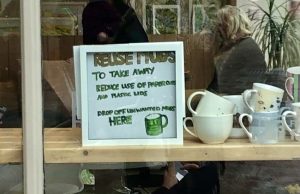
Following the success of the Potty Eco Pots garden reuse scheme, founder Kalina Le Marquand expanded her initiative in early 2023 to encompass another single-use product – takeaway coffee cups.
The scheme aims to set up mug reuse facilities in all local cafes to help reduce the number of disposable coffee cups going to waste.
Islanders can donate their unwanted mugs to participating businesses, which can be used for free instead of single-use cups. Customers can return the mugs another time, to keep them in circulation.
So far, more than a dozen cafes have joined the initiative, with new businesses added regularly.
Plastic bag ban
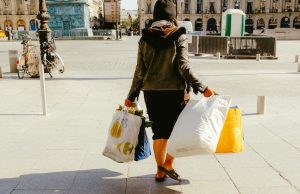
The devastating impacts of plastic bags are widely known, from the greenhouse gases emitted during production to the threat they pose to marine wildlife. Thankfully, governments worldwide are starting to wake up to the consequences of plastic pollution, and are introducing new laws to help combat single-use plastic waste.
In 2022, Jersey’s government banned single-use bags to change consumer behaviour and support the global push to reduce carbon emissions.
Most single-use paper and plastic bags are banned under the Single Use Plastics Law, although customers can still buy reusable bags for a minimum of 70p. But remember, you need to use a bag-for-life at least four times to ensure its carbon footprint is less than the lighter, single-use carrier bag.
Beach clean-up kits
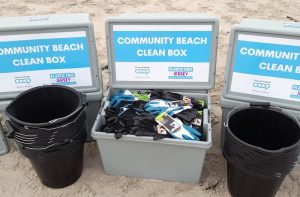
Last but not least, this initiative from Plastic Free Jersey aims to turn the tide on plastic waste thanks to its newly-launched beach clean kits. Each box contains all the essential tools needed to carry out a beach clean, such as bags, buckets, gloves, a simple first aid kit, hand sanitiser and a sharps box.
There are 12 boxes available for all community members to use, including schools, businesses and local groups. You can collect a box from any of the Island’s parish halls.
Plastic Free Jersey’s founding member, Sheena Brockie, hopes the ready-made kits will inspire Islanders to ‘rally around and work together’ to help keep Jersey’s countryside and beaches litter-free.
‘By encouraging people to get involved with a beach clean in their parish, we aim to raise awareness of the impact of plastic pollution on the local environment, empower people with the tools to do something about it, whilst fostering a sense of community and belonging.’
Links
https://www.ruraljersey.co.uk/refill-jersey/
https://www.ruraljersey.co.uk/qa-the-garden-reuse-scheme-solving-jerseys-potty-waste-problem/




